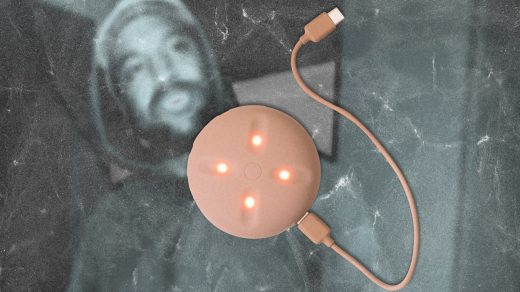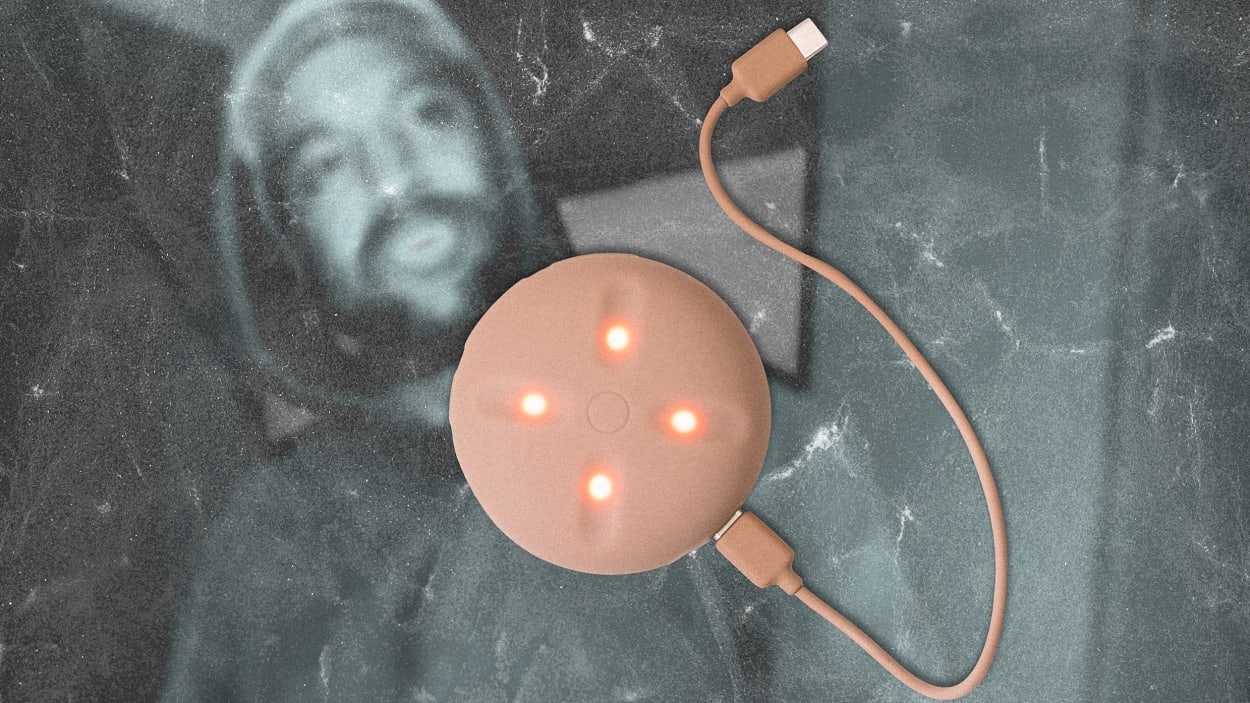Without Ye, Kano plans a future for the Stem Player
It looks like a UFO. There’s not a sharp corner to be seen on the sleek, gray orb. But glance to a nearby wall, and you’ll realize that this “spaceship” is actually a rule-bending projector, just as comfortable displaying media in a rectangle as a circle.
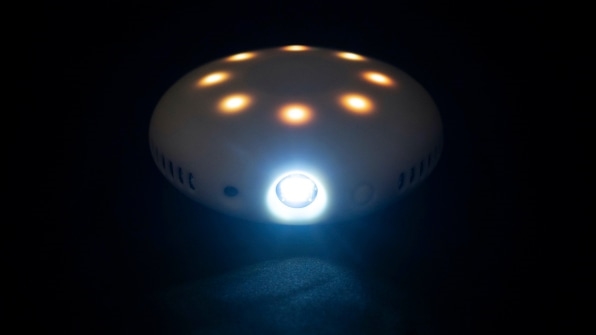
The Stem Projector ($1,000 on preorder) is the latest release from Kano, the playful hardware company that, since its founding nearly a decade ago, made its name selling well-designed educational products like DIY computers and gadgets. Kano’s projector carries the same distinct visual DNA as its most discussed gadget to date, the Stem Player. The smaller silicone pebble-like personal music player allows you to remix music with a tap and swipe of your thumb—and it was built in collaboration with Ye, formerly known as Kanye West.
The Stem Player went viral in February 2022 when Ye claimed to have ended a $100 million deal with Apple to release his album Donda 2 exclusively on the $200 system. (The Stem Players preloaded with Ye’s music have since been sold out and won’t be restocked.) The geeky hardware company was suddenly at the epicenter of the music business, and it’s still striving to be, even though Kano cofounder and CEO Alex Klein says that the partnership between Kano and Ye has ended following Ye’s anti-Semitic rants. (Klein was named alongside Kano and Ye in two lawsuits for the use of unlicensed samples on Donda 2 this year.)
Much like Adidas and even Gap, Kano has found itself in uncharted territory post Ye. These companies gained major advertising and sales momentum by partnering with the famed creative, but now, that momentum has flipped to a brand liability. And whereas Adidas has tens of thousands of employees and billions in revenue to cushion the transition, Kano’s 57-person team operates in one of the most economically tenuous spaces there is: experimental hardware. Kano has faced a certain creative reckoning, too. While its team designed and developed the Stem Player internally, Ye did help establish Kano’s almost synesthetic relationship with lights, color, and sound—the essential design language driving the company to this day.

“I’m not going to be the guy who tries to rewrite history,” says Klein, conceding that Ye was an impactful collaborator on his brand. And that’s still a complicated truth. (Fast Company was unable to reach Ye for comment. He appears to be operating without a PR manager, public legal team, or assistant.)
Now, Kano is launching three new products—a pair of Stem Players released with Wu-Tang Clan member Ghostface Killah (the stage name of Dennis Coles) and the aforementioned video projector that remixes movies much like the Stem Player does music—without the world’s most famous creator who had grown synonymous with the company.
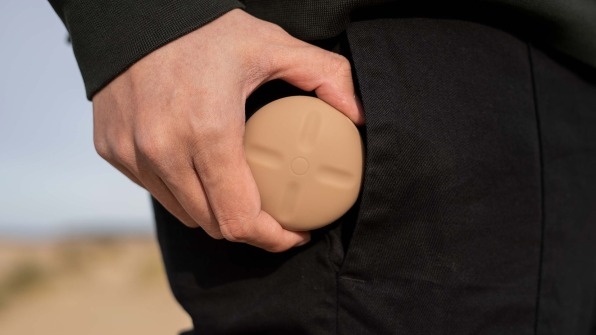
The Stem Player after Ye
Prior to Ye’s social media implosion earlier this year, his partnership was a major buoy for Kano. While Ye was not an equity investor in the company, he was both a creative collaborator and powerful promoter who drove $2.2 million in sales on the Stem Player’s first day of release (the equivalent of royalties on 500 million streams on Spotify). But according to Klein, over the past year and a half, Kano and Ye had an increasing cadence of unspecified disagreements. After Ye’s latest wave of anti-Semitic cracks, Klein says he reached out to him hoping he would take accountability for his remarks, but Ye refused. Whether the half-Jewish Klein personally encountered anti-Semitic remarks from Ye, he notes, “[I] think it’s best not to give certain comments more due than they deserve.”
Klein explains that Kano and Ye had a single four-month contract in 2020 to develop a Ye-exclusive Stem Player, which terminated that summer. Despite discussions at that time to codevelop a music player that Ye would help fund, take to market, and get the necessary music clearances for releases, Klein says that Ye did not make the required payments to Kano or get the clearances for samples on included tracks for that to happen. In 2021, Kano moved forward with the Stem Player release on its own, Klein says, before Ye and Kano “reconvened” for the joint release of the player that August, which was co-branded as the first project for Yeezy Tech. For the launch of Donda 2 on the Stem Player in February of 2022, Klein says that he wrote Ye’s powerful manifesto on artists versus streaming services, which broke down the paltry amounts musicians make online unless they also supplement it with merchandise or touring.
Before and since the falling out, Klein says he has been in long-term discussions with Ye to buy Kano, which initially interested him but no longer does—despite multiple offers from Ye. On one call, Klein says they were joined by a man Ye identified as Ali Alexander (one of the three main organizers of the insurrection on the Capitol) in a $4 million offer to acquire the rights to the Stem Projector.
Now Kano—a team of dozens—finds itself in much the same boat as mega-multinational apparel brand Adidas. After dropping Ye as a partner, Adidas’s strategy was to keep selling its 350 V2, but without the Yeezy branding. It’s a corporate decision that feels, well, odd and unsettling. It’s like selling prints of a famous painting but erasing the artist’s signature and pretending the inherent affiliation between the art and artist has disappeared, too.
Kano isn’t selling the Yeezy Tech Stem Player any longer, and claims to have signed statements from Yeezy regarding Kano’s full ownership of the IP. But Klein isn’t saying that his company’s divorce from Ye has been so simple. While he says the projector and new player were both developed outside of the Ye collaboration, Kano’s previous partnership with Ye is something Klein is still in the process of untangling both for himself and his business—as it created design DNA still seen in Kano’s products.
“The [flesh-tone] color, the way the lights diffuse, the audio and how it sounded, the effects—it would be completely false to claim that there wasn’t creative collaboration between us . . . on that Stem Player that hit the market,” says Klein, who admits that some days he feels “blessed” to have gotten Ye’s eye on a new video cut or color combination. “[But] whether it was something that was the quality of a friendship—and an artistic union of sorts—or whether it was something that felt, in retrospect, more like a marketing collaboration . . .” Klein trails off, sighing and running his hand through his hair, before tagging on another thought a few minutes later.
“At the same time, one thing that needs to be emphasized—and maybe I will hold my hand up and say I didn’t emphasize it enough at the time—was we’d been developing our own process at Kano for nine years,” he says. “And I think we have the best industrial design and UX design team in the world right now.”
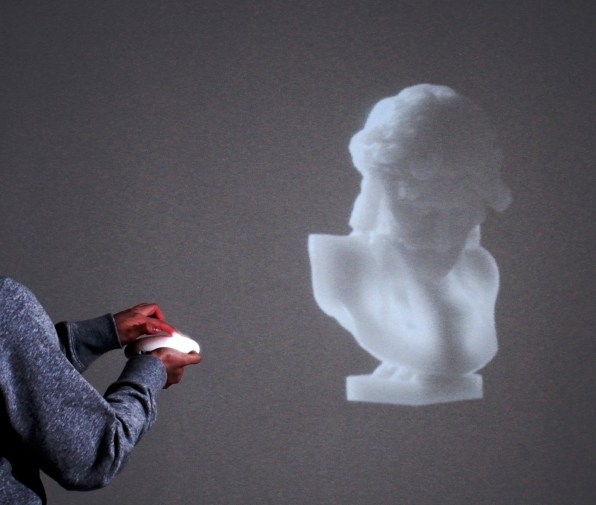
Where music meets Onlyfans
With that team intact, Kano’s new plan is still largely the same as it was last year: to serve as a counterpoint to our glass touchscreen world of apps by releasing distinct hardware that allows the consumer to edit and remix an artist’s work—transforming the consumer into something of a cocreator. Of course, that’s already challenging when platforms from Apple Music to Netflix have digitized media as an all-you-can-eat subscription.
So Kano is pursuing such bold new projects as the aforementioned Stem Projector. Using onboard AI, the projector will cut out your favorite actor from a scene and rotoscope them onto your wall like a Tupac hologram. It also will let you select an object like a tree and will scan through your entire video library to automatically create a supercut of trees. It can even take the colorway of one film, say, Spirited Away, and apply it to another, like The Matrix. While I haven’t tried the device myself, the UI has been designed with assistive AI to make these tasks simple via physical controls instead of complicated video editors, expanding the notion of remixing music on the Stem Player to full video.
“It’s stripping back a lot of the noise and complexity of content selection on Netflix or YouTube, and gets into entering a video game world, where things appear in front of you in a generative way, in a physical space around you,” says Klein.
Supplementing that release are the Ghostface Stem Players with Coles. Much as Donda 2 sold fans on the original Stem Player, we’ll see a unique album by Ghostface Killah released on custom white and black Ghostface Stems, which will run $240 and $360, respectively.
If you want access to the album, you will need to either buy a player or subscribe to Coles’s feed on Kano’s website for $20/month. As Coles explains on a call, he sees this as an opportunity to cut through the oversaturation of online streaming—all while splitting revenue with Kano equally, instead of relying on the fraction of a cent he gets per stream on other services.
“This is music for these people who care about me,” says Coles. “I’m not saying people don’t care about me, but when you’ve got dedicated Ghostface or Wu-Tang fans—these are hardcore fans for life.”
Just as important to Coles is the Stem Player’s technical ability to connect with those fans in a more exclusive venue than streaming services allow, complete with ongoing content updates that sound similar to OnlyFans. Coles is promising to cut new tracks for the Ghostface Stem over time, and he’s planning a series of streams that can actually run as a Ghostface channel on the Stem Projector, where it can be watched or, yes, remixed in all sorts of ways by viewers.
To take this exclusive-access idea to its ultimate conclusion, Coles will offer AMAs and in-person meetups for his Stem fanbase. And together with Ghostface Stem’s producer Gustavo Guerra, he’s planning a Stem Festival in 2023. The idea is that it’s a music festival that only Ghostface Stem owners can attend. In this model, the music player itself becomes something like an NFT, but with more immediate function and meaning in the greater world; the Ghostface Stem becomes an exclusive ticket to a special, specific, world of media.
“This is what I’m getting you. Every few months, take that!” says Coles. “It’s nothing for me to go in the studio and cook something up and just give it to [fans]. I don’t care about that. If you want it, you’re going to go get it.”
Still, if the entire product and profit model sounds a little confusing, that’s only because it is—and by business necessity. We live in an age of software. Investors are squeamish to invest in hardware, and very few companies can sustain the costs and risks of developing physical products long term. Kano is ostensibly without a peer in this space, attempting to woo musicians but challenge Silicon Valley, and much of the corporate music industry, at the same time. And to do so, Kano has its plan: to take what worked about its Stem Player launch with Ye, and scale it to more artists who can co-brand an increasingly rich ecosystem of experimental hardware and streaming models.
“I feel like this is the new form of distribution,” says Guerra. “Ye kicked it off, now [Coles] is gonna kick in the door.”
(44)

